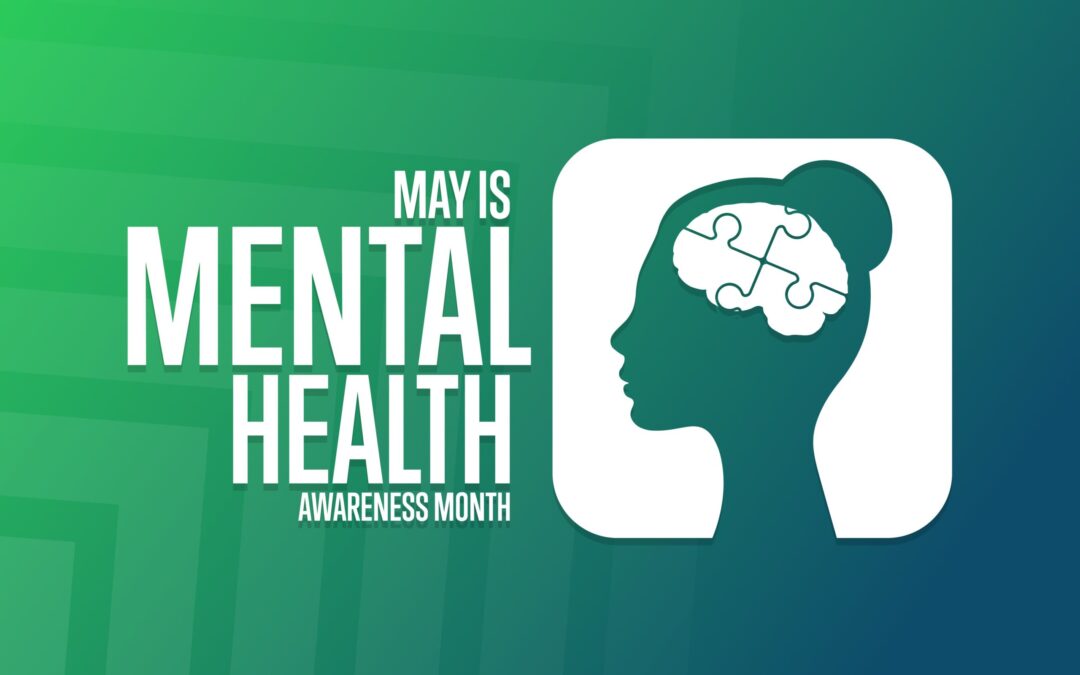It’s May, which means it’s Mental Health Awareness Month! Established in the United States in 1949, Mental Health Awareness Month is observed annually to unite people in promoting mental health awareness and education. It also gives our communities an opportunity to destigmatize mental health conditions and encourage those struggling to seek help.
A person’s mental health is an essential component of their overall health and well-being, but sadly, it is often overlooked. The World Health Organization (WHO), estimates that one in four people will have a mental or neurological disorder at some point in their lives! So many of us in recent times have seen mental health issues climb including anxiety, depression, and stress as a result of the COVID-19 pandemic. In some ways, the pandemic really brought to light the struggle that all people face regardless of background, ability or status. The National Alliance on Mental Illness (NAMI) is recognizing this with their Mental Health Awareness Month 2023 campaign, More Than Enough. The campaign is hoped to help all people understand their inherent value. “Let’s make the 2023 Mental Health Awareness Month a turning point for acceptance, understanding and action in the face of the ongoing mental health crisis,” said CEO of NAMI, Daniel H. Gillison Jr. This campaign can enlighten people struggling to a brighter future and efforts across all communities will be being made this month to help foster well-being.
THE KEY OBJECTIVES OF MENTAL HEALTH AWARENESS MONTH
It is a key objective of Mental Health Awareness Month to reduce stigma surrounding mental health conditions. This is because people who experience stigma are more likely to feel ashamed and guilty, making it harder for them to seek help. Stigmas are harmful in this way and people who suffer from addiction and other issues also face harsh stigmas. The more we alleviate stigmas, the better it will be for those suffering. One way Mental Health Awareness Month helps to reduce stigma is by openly sharing their personal stories of struggle with mental health. This makes it more likely for those struggling to come forward.
Public education about mental health conditions is another key objective of Mental Health Awareness Month. Educating the public about symptoms, treatment options, and information about mental health conditions can alleviate stigmas as well as enable support. Many people struggling can recognize mental health needs in themselves or others with the education provided and help them seek help when needed.
TREATMENT OPTIONS FOR MENTAL HEALTH CONDITIONS:
There are many types of treatment options for those facing mental health challenges. This is another part of the educational process of Mental Health Awareness Month. There is not one size fits all treatment for everyone so it is important for those struggling to talk with their health care providers about what treatments would be best for them. Treatments include but are not limited to:
- Therapy: Psychotherapy (aka Talk Therapy) involves discussing and addressing mental health issues with a mental health professional.
- Medications: Psychiatrists can prescribe antidepressants or antipsychotic medications to treat mental health conditions.
- Holistic Approaches: Acupuncture, mindfulness meditation, and yoga can supplement traditional treatments or be used alone.
- Cognitive Behavioral Therapy (CBT): A type of psychotherapy that aims to identify and change negative behaviors and thoughts.
- Group Therapy: Individuals struggling with similar mental health issues participate in group therapy with their therapist. Having a sense of community and support is one of the benefits of this type of therapy.
- Hospitalization: When individuals require round-the-clock care and supervision due to severe mental illness, hospitalization or residential treatment may be necessary.
- Self-care: People can manage their mental health and reduce the risk of developing mental health conditions through self-care practices like exercise, healthy eating, and sleep.
There are options to get well and the importance of mental health is just as great as that of physical health. Scottsdale Recovery and Detox Center® provides a wide range of services to address substance abuse issues and co-occurring conditions like anxiety or depression. Visit scottsdalerecovery.com or call 1-888-NODRUGS for more information and support.

